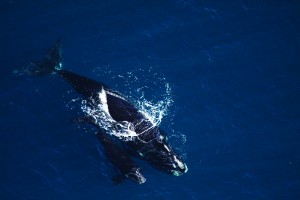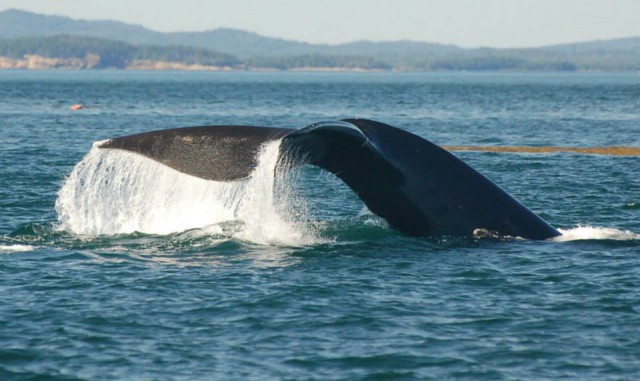A necropsy for the nine-year-old male will be completed in the following days

A dead North Atlantic right whale has been spotted floating in the Gulf of St. Lawrence and marks the first death of 2019.
“We just hope this isn’t a reoccurring thing,” said Tonya Wimmer, executive director of the Marine Animal Response Society.
She said the carcass was first noticed by the National Oceanic and Atmospheric Administration’s aerial surveillance team. The Department of Fisheries and Oceans later tweeted about the incident Tuesday.
Wimmer is on her way to assist in the necropsy of the nine-year-old male, known as “Wolverine” to researchers.
“At this point, we don’t know why the animal died,” she said. “We’re hoping to start the necropsy tomorrow.”
Further restrictions decided by DFO, Wimmer
The North Atlantic right whale is critically endangered, with a little more than 400 left in the world.
In 2017, 17 right whales died, with 12 of those deaths occurring in Canada. No calves were born in 2018 but seven were spotted this year.
New research — led by our colleague in ocean protection, Dr. Kimberly Davies from UNB Saint John — suggests a major food source for the animal, the Calanus finmarchicus, was disrupted due to the changing climate. This possibly led the species to seek food elsewhere and into shipping lanes and fishing nets.

Following the 17 deaths, the federal government placed strict restrictions on fishing and limits to slow marine traffic in the area. Some of these restrictions were later relaxed.
Once the necropsy is complete, it will be up to Fisheries and Oceans to decide whether regulations currently in place need modifying, Wimmer said.
“Again, we don’t know the cause of death,” she said.
Too early to be optimistic
Matt Abbott, Fundy Baykeeper and our Marine Conservation Director, said whales are integral to our ocean ecosystem.
“Whales provide a nutrient-mixing function as they move through the water,” he said Thursday. “We lose a lot of ocean function when we lose a given species of whale.”
He calls the death of Wolverine tragic but, at least, is pleased the issue is being taken seriously. Likewise, when carcasses are discovered, action by teams like the Marine Animal Response Society, Group for Research and Education on Marine Mammals and the National Oceanic and Atmospheric Administration are swift.
Abbott said climate change is “shaking things out” and new norms are being set. But while no right whales died in 2018, it’s too early to be optimistic.
“Maybe the Bay of Fundy will be will be hospitable to them again, but I don’t think we should expect that,” he said.

